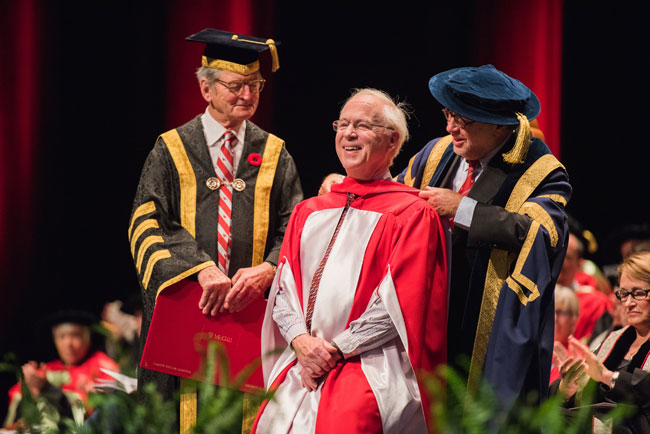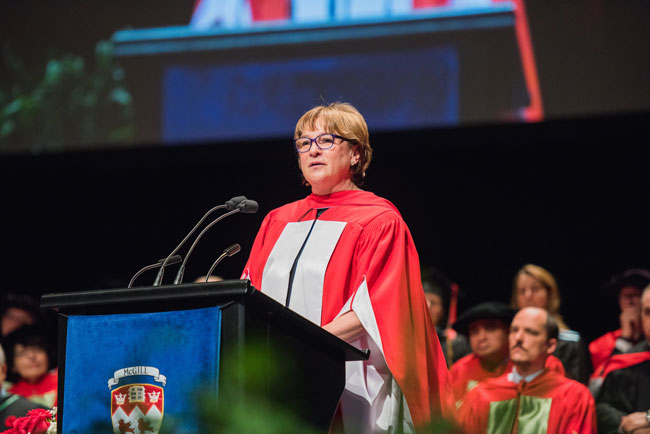
By Neale McDevitt
Although they come from different backgrounds, Timothy Brodhead and Jennifer Stoddart – recipients of honorary degrees at Tuesday’s Convocation ceremonies – had similar messages for the Class of 2015. More than any quality, grads should cultivate their sense of compassion.
“My generation grew up in a completely different world than you did. Yes we faced challenges… But overall my peers and I graduated into a world that was pretty stable. Predictable,” said Brodhead. “Careers, at least for those of us armed with a McGill degree, were for a lifetime. Marriages were more or less permanent unions… Jobs were plentiful. Incomes and standards of living seemed to be on a long-term gradient moving in the right direction.
“But you are graduating into a world that is anything but predictable,” he continued. “You’ve worked hard to obtain your degrees but most of the knowledge you’ve acquired will be out of date within five years. You will have between six and eight careers over you’re working lives. And statistically you only have about a 50-50 chance of a lifetime partnership.”
Brodhead said the Class of 2015 will probably live through massive social and economic disruption, spurred, in part, by unprecedented migrations of people desperately seeking security and opportunity.
Among the challenges these new grads will face, Brodhead listed climate change and new technology that will result in the disappearance of whole categories of employment.
“I’m not saying this in order to raise your anxiety levels on this happy day,” he said to some nervous laughter in the crowd. “It may seem a bit scary but I think it’s also exhilarating. And I envy you for it. Because you get to ask whether these choices are going to lead to a world of growing inequality; of conflict over basic resources like clean air and clean water; of growing selfishness. Or will these changes lead to a society that is more sustainable, more just, more creative and more fulfilling?
Brodhead knows more than a little about helping nurture justice and sustainability. He enjoyed a celebrated 25-year career in the field of international development as a volunteer in Africa with CUSO (Canadian University Service Overseas) and then as founding director of several non-governmental organizations. This work culminated with his appointment as Executive Director of the Canadian Council for International Co-operation, a national organization representing over 120 non-profit Canadian international development agencies.
“So let me ask you now what do you want to be able to tell the future generation 50 years from now that you’ve done to improve the human condition and take care of the biosphere,” Brodhead said. “What counts now is not what you know it’s who you are. McGill, your teachers, your families – all have done their part and now it’s up to you. My wish is that with your knowledge you leave here with three qualities to guide your choices.
“First your sense of wonder – which we all have as children but we lose too soon… Secondly curiosity,” said Brodhead. “And finally compassion. Because the world needs more empathy, more love – and so do you. The world is waiting. It’s impatient. Go for it.”
To view Timothy Brodhead’s Convocation address, click on the thumbnail at the bottom of this page.

Later that afternoon, Jennifer Stoddart, also appealed to graduating students to have empathy for others. “What will really distinguish you as you move around our society in Canada and beyond is the respect you show to your fellow citizens,” said Stoddart. “Respect seems to be on an abrupt decline. I conclude this from my work as Privacy Commissioner which exposed me to some of the darkest doings – particularly on the Internet – that I could ever imagine.”
Stoddart’s career in public service has been devoted primarily to human rights. After earning a Bachelor in Civil Law degree from McGill, she became director and then vice-president, from 1987 to 2000, at the Commission des droits de la personne et des droits de la jeunesse du Québec. In 2000, she became president of the Commission d’accès à l’information du Québec, where she promoted greater transparency for information held by the government. Three years later, Stoddart was appointed Privacy Commissioner of Canada. During her term, she worked to ensure compliance with Canada’s privacy laws in an age where personal information is in constant global transit.
“A large part of our existence takes place on the Internet. It’s a world that allows us unprecedented freedom,” continued Stoddart. “Behind screens and anonymously people are free to express themselves without fear of being identified.
“We’ve seen young persons commit suicide, unable to bear the online attacks directed against them. Harassment and bullying seem to be all too frequent in many Canadian educational facilities from grade school do universities,” she continued. “Trashing seems to be one of the most frequent words used in the media. And every day we have fresh news of the indignities [heaped upon] those who, around the globe, find themselves in situations of constant violence and deprivation.
“So my message to you as you go forth is to remember that respect of others has always been the basis for successful human interaction… Respect for people for the environment and respect for all living creatures preceded the elaboration of human rights codes and charters of rights and freedoms as well as other rules,” said Stoddart.
“Sometimes these instruments are misused to justify a culture of narcissism where the self is the center of everything. But they are the method by which Canadian society reiterates the fundamental value of respect for others and their dignity.”
Related story
“Life is long… don’t be afraid of change,” Milner tells new grads
To view Jennifer Stoddart’s Convocation address, click on the thumbnail below.
